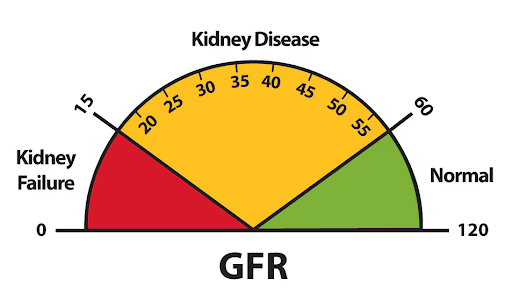Why Kidney Tests Matter: Key Check-Ups for Your Kidney Health
10/01/2025
Your Kidneys Work Hard, Are They Healthy? Your kidneys filter approximately 50 gallons of blood each day, removing waste, balancing fluids, and supporting overall health. Despite this crucial role, kidney disease is often called a silent killer because it progresses unnoticed until significant kidney damage has occurred. That’s why assessing kidney function with regular testing is vital for early detection and prevention of chronic kidney disease (CKD).
According to National Kidney Foundation, over 37 million U.S. adults have CKD, yet 90% of them are unaware of their condition. High blood pressure, diabetes, and family history are major risk factors, and without regular check-ups, kidney disease can go undiagnosed until severe complications arise. This is why routine kidney tests, such as blood tests, urine tests, and glomerular filtration rate (GFR) assessments, are essential for detecting issues early. Timely intervention can prevent kidney failure and the need for dialysis or a kidney transplant. If kidney disease progresses, exploring home dialysis options may help manage treatment from the comfort of your home.

Why Are Kidney Tests Important?
Many kidney conditions, including chronic kidney disease (CKD), develop without noticeable symptoms in the early stages. By the time obvious signs such as swelling, fatigue, or changes in urine output appear, kidney function may already be compromised. Regular kidney tests allow for early detection, helping to identify issues before they escalate into severe kidney damage or kidney failure.
- Your kidneys filter about 50 gallons of blood each day, removing waste and balancing fluids.
- 1 in 3 adults in the U.S. is at risk for kidney disease.
- High blood pressure and diabetes are the two leading causes of kidney failure.
- 90% of people with CKD don’t know they have it until it’s advanced.
- Routine kidney tests can reduce the risk of CKD progression by up to 50% when combined with early intervention.
Because kidney disease can be managed if caught early, routine blood and urine tests are the best way to monitor kidney health and avoid severe complications.
Key Kidney Function Tests
Regular testing helps assess kidney health and detect potential problems before they worsen. Below are the most common kidney function tests and what they reveal.
1. Glomerular Filtration Rate (GFR) Test
- Measures how well your kidneys filter blood.
- A healthy kidney has a GFR of 90 or above.
- A GFR below 60 for three months or more indicates chronic kidney disease.
- A GFR below 15 signals kidney failure, requiring dialysis or a kidney transplant.
- You can use this eGFR calculator to check your Glomerular Filtration Rate.

2. Creatinine Test
- Creatinine is a waste product that healthy kidneys filter out.
- High creatinine levels suggest reduced kidney function.
- Normal range: 0.7 to 1.3 mg/dL (men), 0.6 to 1.1 mg/dL (women)
3. Estimated Glomerular Filtration Rate (eGFR)
- A formula using creatinine levels, age, sex, and body size to estimate kidney function.
- eGFR below 60 indicates kidney disease, and below 15 suggests severe damage.
4. Urine Test for Protein (Albumin-to-Creatinine Ratio – ACR Test)
- Detects protein (albumin) in urine, which can indicate kidney damage.
- Normal range: Less than 30 mg/g.
- Higher levels suggest kidney disease progression.
5. Blood Urea Nitrogen (BUN) Test
- Measures waste products in the blood.
- Normal range: 7 to 20 mg/dL.
- Higher levels can indicate kidney dysfunction or dehydration.
6. High Blood Pressure Check
- Hypertension is a leading cause of kidney failure.
- Monitoring blood pressure helps assess kidney health.
- Ideal range: Less than 120/80 mmHg.
Understanding Kidney Test Results
| Test | Healthy Range | What Abnormal Results May Indicate |
| GFR | 90+ | Below 60 suggests CKD; below 15 indicates kidney failure |
| Creatinine | 0.7 – 1.3 mg/dL (men), 0.6 – 1.1 mg/dL (women) | High levels indicate kidney damage |
| eGFR | 90+ | Below 60 suggests kidney disease |
| Urine ACR | Less than 30 mg/g | Higher levels suggest kidney damage |
| BUN | 7 – 20 mg/dL | High levels may indicate kidney dysfunction |
| Blood Pressure | Below 120/80 mmHg | High BP can lead to kidney damage |
Who Should Get Tested?
Certain individuals are at a higher risk of kidney disease and should undergo regular testing, including:
- People with high blood pressure or diabetes, as these conditions can damage the kidneys over time.
- Those with a family history of kidney disease or kidney failure.
- Individuals over 60 years old, since kidney function naturally declines with age.
- People with heart disease or obesity, as these factors increase the risk of kidney issues.
- Anyone experiencing swelling, fatigue, or changes in urine output, which could indicate kidney problems.
What Can You Do to Protect Your Kidneys?
Early detection is key to preventing kidney failure. Here’s how you can protect your kidney health:
1. Control Blood Pressure
- Keep blood pressure below 120/80 mmHg.
- Reduce salt intake and manage stress.
- Take prescribed medications if necessary.
2. Manage Blood Sugar Levels
- Diabetes is a major cause of kidney disease.
- Monitor blood sugar levels and maintain a healthy diet.
- Regular check-ups help detect early signs of kidney disease.
3. Maintain a Kidney-Friendly Diet
- Eat fresh fruits, vegetables, and lean proteins.
- Avoid processed foods high in sodium, phosphorus, and sugar.
- Stay hydrated but limit excessive fluid intake if advised by your doctor.
4. Get Regular Kidney Function Tests
- Annual tests are recommended for high-risk individuals (diabetes, high blood pressure, family history).
- Early diagnosis helps prevent kidney disease progression.
5. Avoid Overuse of Painkillers
- Long-term use of NSAIDs (ibuprofen, naproxen) can harm kidneys.
- Use alternatives under medical supervision.
6. Stay Active and Maintain a Healthy Weight
- Regular exercise supports kidney health and reduces the risk of high blood pressure and diabetes.
- Aim for 30 minutes of activity most days of the week.
Take Charge of Your Kidney Health
Your kidneys work tirelessly, filtering about 50 gallons of blood every day to remove waste and excess fluids. But how often do you check on them? Kidney disease is silent in its early stages, making regular testing crucial for early detection and prevention.
A simple blood test, urine test, or GFR assessment can provide a snapshot of your kidney function, helping you stay ahead of potential problems. If left unchecked, kidney issues can progress to chronic kidney disease (CKD), kidney failure, or the need for dialysis or a kidney transplant.
Don’t wait for symptoms to appear, prioritize your kidney health today. If you haven’t had a kidney function test recently, schedule one with your doctor. Protecting your kidneys now means ensuring long-term health and well-being for the years to come.
Frequently Asked Questions
Regular kidney function tests are important because they detect problems early, often before symptoms appear. Early detection allows timely treatment, slows disease progression, and reduces the risk of kidney failure and related complications.
Five warning signs include swelling in the hands, feet, or face, changes in urination, persistent fatigue, shortness of breath, and nausea or loss of appetite due to toxin buildup.
The most important kidney tests include eGFR (to measure filtration), serum creatinine, blood urea nitrogen (BUN), urine protein tests, and imaging scans such as ultrasound or CT for structural evaluation.
Factors like dehydration, certain medications, high-protein meals, strenuous exercise, or acute illness can temporarily affect kidney test results, making interpretation less accurate without considering overall health and repeat testing.
Yes. Dehydration can elevate creatinine and blood urea nitrogen (BUN) levels, mimicking impaired kidney function. Proper hydration before testing ensures more accurate results and reduces the risk of misdiagnosis.
The three early signs are changes in urination (frequency, color, or foamy urine), swelling due to fluid retention, and persistent fatigue caused by toxins and reduced red blood cell production.
References and links

Dr. Allen Kaufman is the Chief Medical Officer and Senior VP for Clinical & Scientific Affairs at Dialyze Direct, with over four decades of experience in Nephrology. He began his career in 1980 and has held leadership roles including Chief of Nephrology & Hypertension at Beth Israel Medical Center (1998–2004), Chief of Dialysis at the Bronx VA Medical Center (1982–1990), and Chief of the Yorkville Dialysis Unit at Beth Israel and the Renal Research Institute (1990–2000). Dr. Kaufman has authored over 100 scientific publications and served as Principal or Co-Investigator on numerous NIH-funded research studies. A Fellow of the American College of Physicians, he is board-certified in Nephrology and Internal Medicine. He earned his medical degree from the University of Rochester and completed training at the Hospital of the University of Pennsylvania and Mount Sinai in New York. Dr. Kaufman is widely recognized with multiple “Best Doctor” and “Patients’ Choice” awards.